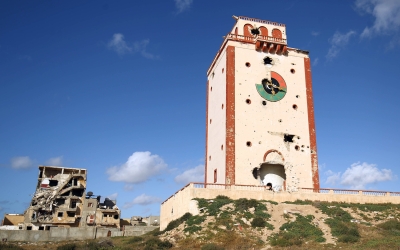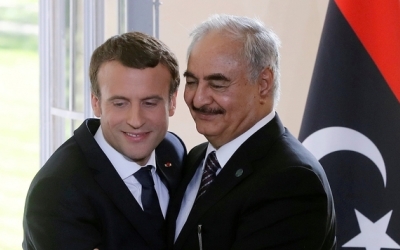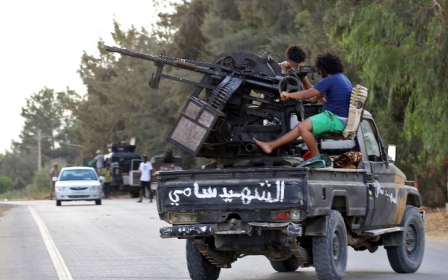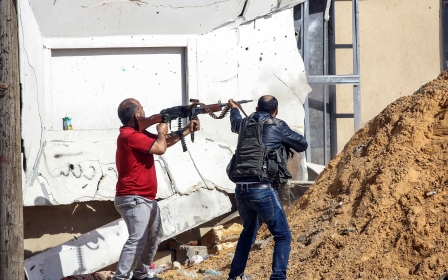More than 120 killed as Haftar forces press attack on Tripoli
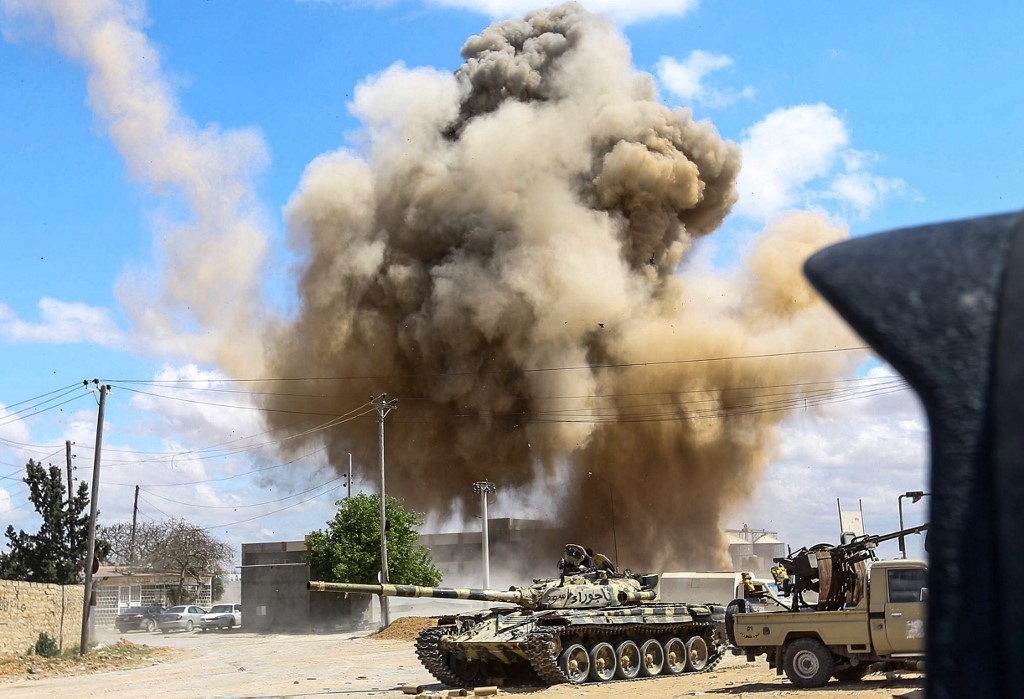
Fighting near Tripoli has killed 121 people and wounded 561 since strongman Khalifa Haftar launched an offensive earlier this month to take the Libyan capital, the World Health Organisation (WHO) said Sunday.
Eastern Libyan forces under Haftar have pursued their advance on the capital Tripoli, the head of the eastern parliament in the divided country said on Saturday, despite international calls for a halt.
As well as fighting on the ground, the two sides have launched daily air raids and accuse each other of targeting civilians.
An eastern Libyan warplane crashed on Sunday in southern Tripoli, military sources told the Reuters news agency. No more details were immediately available.
Haftar met with Egypt's President Abdel Fattah el-Sisi in Cairo on Sunday to discuss the latest developments in Libya, Sisi's spokesman said.
Egypt, which has close ties with Haftar, released photos showing the eastern commander sitting with Sisi and his head of intelligence, Abbas Kamel.
'Repeated attacks on health care workers'
The United Nations' office for humanitarian affairs said more than 13,500 people had been displaced by the clashes, while more than 900 residents are living in shelters.
"Three medical personnel have been killed and five ambulances have been incapacitated by shrapnel," OCHA said in a Saturday statement.
WHO's Libya account said on Twitter the organisation was sending medical supplies and more staff to Tripoli, and denounced "repeated attacks on health care workers, vehicles" during the fighting, which erupted on 4 April.
An eastern air strike hit the yard of a school on the southern outskirts of Tripoli, where eastern forces have been confronted by those allied with Prime Minister Fayez al-Serraj's internationally recognised Government of National Accord (GNA), Reuters said.
In a possible new front, Haftar's eastern Libya National Army (LNA) was readying a unit to move to the al-Sider and Ras Lanuf oil ports, Libya's biggest, on the eastern coast, anticipating an attack from an armed group allied with Serraj, eastern military officials said.
"The force will strengthen the protection of the ports," one official said, asking not to be identified.
'We need to get rid of militias and terrorist groups'
Haftar, 75, a military commander under deposed leader Muammar Gaddafi who later lived in the United States, has the support of key Gulf Arab states, as well as Egypt and Russia, AFP said.
His forces swept from their eastern stronghold through Libya's sparsely populated desert, taking parts of the south, before beginning their assault on Tripoli.
Last week, the European Union called on the LNA to stop its attacks, having agreed on a statement after France and Italy sparred over how to handle the conflict.
AFP quoted UN spokesman Rheal Leblanc as saying on Friday that "many families remain stranded inside conflict-affected areas" with supplies running short.
Still, the eastern parliament head said it would press the offensive launched a week ago under Haftar, the latest outbreak of a cycle of conflict since the 2011 overthrow of Gaddafi.
"We need to get rid of militias and terrorist groups," said Aguila Saleh, head of the House of Representatives allied to Haftar, using a reference eastern officials often make to describe forces allied to the Tripoli government, which relies on support from several armed groups.
"We assure the residents of Tripoli that the campaign to liberate Tripoli will be limited and not violate any freedoms, but restore security and fight terrorism," Saleh told lawmakers in a session in the main eastern city of Benghazi.
For its part, the Tripoli government will agree to a ceasefire only if the LNA troops return back east, government spokesman Mohanad Younes told reporters.
Forces loyal to Serraj's government have so far kept the eastern offensive at bay. Fierce fighting has broken out around a disused former airport about 11km from the centre.
An eastern military source said a warplane belonging to the LNA had struck a military camp in an eastern Tripoli suburb.
In a separate strike, the yard of a primary school was hit, a Reuters reporter at the scene said. An LNA official said the plane had targeted a camp of Serraj's forces.
UN conference postponed
Saleh said that the United Nations mission to Libya and Serraj's GNA had failed to expel armed militias from the capital, and promised Libya would hold long-delayed elections after the Tripoli operation ended.
Haftar's offensive had surprised the United Nations, which had been planning to hold a national conference on Sunday to prepare Libya for elections. It has been postponed.
As well as the humanitarian cost, the conflict threatens to disrupt oil supplies, increase migration to Europe, scupper a UN peace plan, and allow militants to exploit the chaos.
Middle East Eye propose une couverture et une analyse indépendantes et incomparables du Moyen-Orient, de l’Afrique du Nord et d’autres régions du monde. Pour en savoir plus sur la reprise de ce contenu et les frais qui s’appliquent, veuillez remplir ce formulaire [en anglais]. Pour en savoir plus sur MEE, cliquez ici [en anglais].


